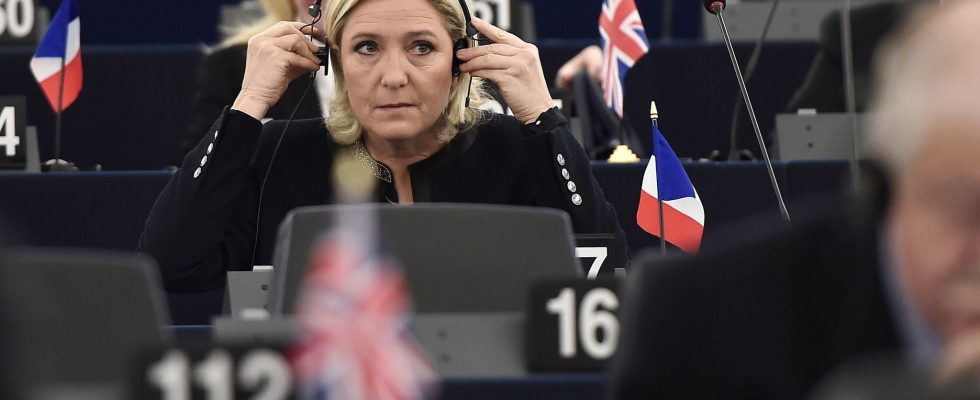Will the National Rally come out on top in the European elections in France on June 9? In any case, this is what most polls have announced so far, which place the RN list, led by the party’s president, Jordan Bardella, well ahead of that of the presidential Renaissance party.
Seeing the RN at the top of the European ballot is no longer really a surprise: in 2014 and in 2019 already, the party with the flame had already beaten all the other lists. The result of almost forty years of breakthroughs by the National Front in the European Parliament, with Euroscepticism and the rejection of European institutions as a central campaign axis, whether first through Jean-Marie Le Pen, then by Marine Le Pen and Jordan Bardella.
Eurosceptic and sovereignist competition
If the National Front failed to present a list in the European elections in 1979, the following elections were the occasion for the first electoral breakthroughs of Jean-Marie Le Pen’s National Front. Focusing a large part of his political program on strong euroscepticism and the defense of a “Europe of nations”, he thus obtained 10.95% in 1984 – the first national election in which the FN exceeded the 10% mark -, then 11.7% in 1989.
In 1994, the National Front once again exceeded 10%, still leading a very aggressive campaign on the European question. The context was then favorable, whereas two years earlier, the referendum on the Treaty of Maastricht – and the creation of the European Union as we know it today – had largely divided France. Jean-Marie Le Pen, with a fairly explicit campaign slogan (“Against the Europe of Maastricht, go France!”), advocates in particular an exit from the EU, i.e…. a program very similar to that of the Movement for France (MPF) of Philippe de Villiers, who obtained more than 12% of the votes. Or almost 23% in total for the two Eurosceptic lists.
In 1999, however, there was a decline, with internal quarrels which largely disrupted the National Front campaign. Bruno Mégret, former number 2 of the party with the flame, left the FN a few months earlier, openly denouncing the strategic choices of Jean-Marie Le Pen. Taking with him a large part of the party’s executives, he decided to lead his own list in the European elections with his new political force, the National Republican Movement (MNP). Result: only 5.7% for the FN, and 3.3% for the MNP. But the pool of sovereignist and Eurosceptic votes has not yet disappeared: the tandem Charles Pasqua – Philippe de Villiers thus comes in second position in the ballot with 13% of the votes, ahead of the RPR then led by Nicolas Sarkozy.
Again around 10% in the 2004 election, the National Front experienced another bitter failure in 2009. In a country in the midst of an economic crisis, the European election mobilized very few voters (60% abstention). The FN obtained only 6.3% of the votes cast, suffering in particular from the flight of a good number of its voters towards the UMP of President of the Republic Nicolas Sarkozy.
The turning point of 2014
Five years later, however, the situation is completely reversed, and the European elections represent a major turning point in the political history of the National Front. Jean-Marie Le Pen has not been the party’s president since 2011, and has since handed over the reins to his daughter Marine Le Pen, who came third in the 2012 presidential election.
In a France presided over by François Hollande, whose popularity was falling very quickly, the National Front rose to the top of a national election for the first time in its history. Obtaining nearly 24.9% of the votes, or 10 points more than the Socialist Party list, and four points more than the UMP, the success is clear for the FN, which multiplies its result by six compared to 2009.
A sign of the strong roots of the FN (which became the National Rally in 2018) in French political life, which will continue in 2019 with a new candidate: the now president of the RN Jordan Bardella. His list also comes at the top of the poll, ahead of Emmanuel Macron’s La République en Marche by a little more than one point.
If in recent years, the National Rally has sought to reduce the scope of its attacks on the European Union, by no longer advocating “Frexit” or France’s exit from the euro, its euroscepticism remains a major axis of his campaign. And while everywhere in Europe, far-right forces could obtain historic results during the vote on June 9 (the Fratelli d’Italia party of Georgia Meloni in Italy, the AFD in Germany, the PVV of Geert Wilders in the Netherlands…), this could benefit the National Rally to feed its narrative of de-demonization and trivialization. With the 2027 presidential election already in sight.
